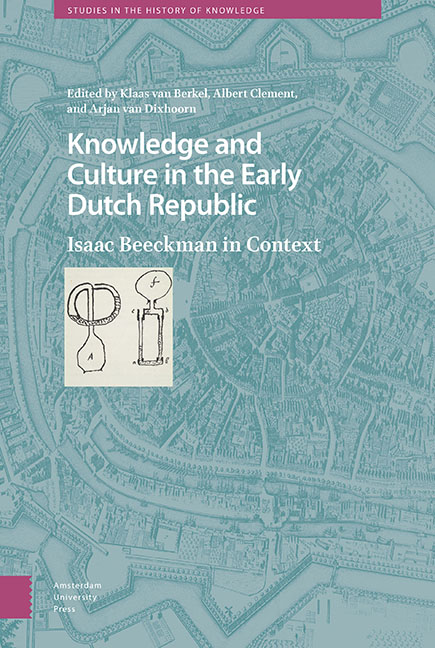11 - Networks of Knowledge in Middelburg around 1600: The Context of Isaac Beeckman as a Young Man
Published online by Cambridge University Press: 07 October 2022
Summary
Abstract
Isaac Beeckman's innovative attitude to the study of nature has been attributed to his mixed training as both a craftsman and a scholar. More generally, the Dutch contribution to early modern science has been ascribed to three factors: (1) the easy mingling of scholars, merchants and craftsmen in the early Dutch Republic; (2) the vital role of the Dutch academic institutions as centres of both teaching and innovative research; and (3) a congruence of early scientific and mercantile activities and values in the early modern Dutch trading communities. Against this background, this chapter examines the question of which persons and circumstances have contributed to Beeckman's early education in his birthplace Middelburg. Although it appeared possible to identify early modern Middelburg as a fertile melting pot of mercantile, artisanal and learned contacts, this study underpins Van Berkel's earlier conclusion that the life of the young Beeckman unfolded for the largest part in a milieu of Flemish immigrants, with no demonstrable connection to the Middelburg learned community.
Keywords: Isaac Beeckman, networks of knowledge, Zilsel thesis, Middelburg, Telescope
Introduction: Beeckman and the Zilsel Thesis
Isaac Beeckman was both a craftsman and a scholar. He was trained by his father as a candle maker and a constructor of waterworks, but he also studied philosophy, mathematics, theology and medicine. This mixed education seems to be the key to Beeckman's innovative attitude towards the study of nature. In his 2013 monograph on Beeckman his biographer Klaas van Berkel claims that this early modern researcher ‘was the first to devise a completely mechanical philosophy of nature, and thus introduced an approach that would become a cornerstone of the new science’. Van Berkel even goes further to stipulate that ‘Beeckman played a crucial but not always recognized role in the early stage of the Scientific Revolution’, even in such a way that Beeckman could be seen as ‘the missing link between artisanal knowledge and mathematical science’. With this latter statement Van Berkel refers to the thesis formulated in 1942 by Edgar Zilsel, namely that the new science emerged from the empirical work of artisans and from the interaction between craftsmen and scholars. Hands-on knowledge of materials and craftsmanship, combined with theoretical academic knowledge, or, succinctly put, ‘the union of hand and mind’, had resulted in the empirical and experimental methodology that formed the core of the new science of the seventeenth century.
- Type
- Chapter
- Information
- Knowledge and Culture in the Early Dutch RepublicIsaac Beeckman in Context, pp. 261 - 316Publisher: Amsterdam University PressPrint publication year: 2022

